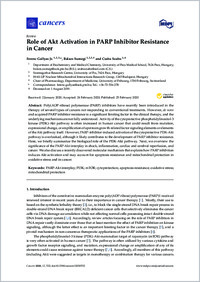Role of akt activation in PARP inhibitor resistance in cancer
- Gallyas, Ferenc Department of Biochemistry and Medical Chemistry, University of Pecs Medical School, 7624 Pecs, Hungary - Szentagothai Research Centre, University of Pcs, 7624 Pecs, Hungary - HAS-UP Nuclear-Mitochondrial Interactions Research Group, 1245 Budapest, Hungary
- Sumegi, Balazs Department of Biochemistry and Medical Chemistry, University of Pecs Medical School, 7624 Pecs, Hungary - Szentagothai Research Centre, University of Pcs, 7624 Pecs, Hungary - HAS-UP Nuclear-Mitochondrial Interactions Research Group, 1245 Budapest, Hungary
- Szabo, Csaba Department of Biochemistry and Medical Chemistry, University of Pecs Medical School, 7624 Pecs, Hungary - Chair of Pharmacology, Department of Medicine, University of Fribourg, 1700 Fribourg, Switzerland
-
01.03.2020
Published in:
- Cancers. - 2020, vol. 12, no. 3, p. 532
English
Poly(ADP-ribose) polymerase (PARP) inhibitors have recently been introduced in the therapy of several types of cancers not responding to conventional treatments. However, de novo and acquired PARP inhibitor resistance is a significant limiting factor in the clinical therapy, and the underlying mechanisms are not fully understood. Activity of the cytoprotective phosphatidylinositol-3 kinase (PI3K)-Akt pathway is often increased in human cancer that could result from mutation, expressional change, or amplification of upstream growth-related factor signaling elements or elements of the Akt pathway itself. However, PARP-inhibitor-induced activation of the cytoprotective PI3K-Akt pathway is overlooked, although it likely contributes to the development of PARP inhibitor resistance. Here, we briefly summarize the biological role of the PI3K- Akt pathway. Next, we overview the significance of the PARP-Akt interplay in shock, inflammation, cardiac and cerebral reperfusion, and cancer. We also discuss a recently discovered molecular mechanism that explains how PARP inhibition induces Akt activation and may account for apoptosis resistance and mitochondrial protection in oxidative stress and in cancer
- Faculty
- Faculté des sciences et de médecine
- Department
- Médecine 3ème année
- Language
-
- English
- Classification
- Biological sciences
- License
-
License undefined
- Identifiers
-
- RERO DOC 328629
- DOI 10.3390/cancers12030532
- Persistent URL
- https://folia.unifr.ch/unifr/documents/308743
Statistics
Document views: 125
File downloads:
- pdf: 255
